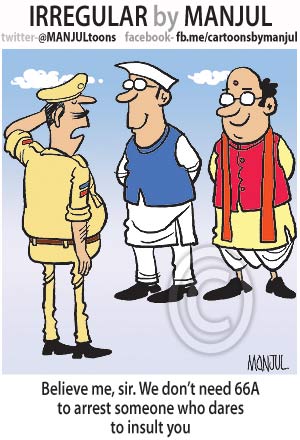Welcome this judgment! Else these was a damocles sword hang around any body posting any stuff which might look offensive to the aggrieved party...Threat of danger to individual liberty and freedom of expression! Real democracy at work with this marvelous piece by the Supreme court!
[h=1]Supreme Court strikes down Section 66A of IT Act which allowed arrests for objectionable content online[/h]
NEW DELHI: The Supreme Court on Tuesday declared Section 66A of Information Technology Act as unconstitutional and struck it down.
This section had been widely misused by police in various states to arrest innocent persons for posting critical comments about social and political issues and political leaders on social networking sites.
The court said such a law hit at the root of liberty and freedom of expression, two cardinal pillars of democracy.
The court said such a law hit at the root of liberty and freedom of expression, the two cardinal pillars of democracy. The court said the section has to be erased from the law books as it has gone much beyond the reasonable restrictions put by the Constitution on freedom of speech. The Supreme Court said section 66A was vaguely worded and allowed its misuse by police.
The court, however, upheld the validity of section 69B and the 2011 guidelines for the implementation of the I-T Act that allowed the government to block websites if their content had the potential to create communal disturbance, social disorder or affect India's relationship with other countries.
However, the court watered down section 79 of the I-T Act making it further difficult for the police to harass innocent for their comments on social network sites.
Supreme Court strikes down Section 66A of IT Act which allowed arrests for objectionable content online - The Times of India
[h=1]Supreme Court strikes down Section 66A of IT Act which allowed arrests for objectionable content online[/h]
NEW DELHI: The Supreme Court on Tuesday declared Section 66A of Information Technology Act as unconstitutional and struck it down.
This section had been widely misused by police in various states to arrest innocent persons for posting critical comments about social and political issues and political leaders on social networking sites.
The court said such a law hit at the root of liberty and freedom of expression, two cardinal pillars of democracy.
The court said such a law hit at the root of liberty and freedom of expression, the two cardinal pillars of democracy. The court said the section has to be erased from the law books as it has gone much beyond the reasonable restrictions put by the Constitution on freedom of speech. The Supreme Court said section 66A was vaguely worded and allowed its misuse by police.
The court, however, upheld the validity of section 69B and the 2011 guidelines for the implementation of the I-T Act that allowed the government to block websites if their content had the potential to create communal disturbance, social disorder or affect India's relationship with other countries.
However, the court watered down section 79 of the I-T Act making it further difficult for the police to harass innocent for their comments on social network sites.
Supreme Court strikes down Section 66A of IT Act which allowed arrests for objectionable content online - The Times of India


